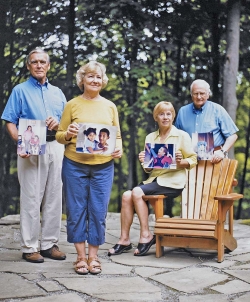By Carol Connare Cambo
Yankee Magazine

have dedicated their efforts toward improving basic services in Central America.
Photographer: Matt Kalinowski
© 2008
Smiling out from photos, the children of Tela, Honduras, win hearts with their wide eyes and toothy grins. It’s the kids, says Linda Gilbert (who has six grandchildren of her own) who continue to inspire Hands to Honduras-Tela (H2HT), based in Charlotte and Shelburne, Vermont.
Honduras is one of the poorest countries in the Western Hemisphere and is thus a magnet for service groups. Linda Gilbert and her friend Colleen Haag (Shelburne’s town clerk) joined a Rotary International trip in 2003; they returned home thinking how much more they could do. The people of Tela needed new facilities and equipment, but they also needed people trained to run them.
Shelburne’s phone lines lit up as a committee of like-minded volunteers drew together. The effort has mushroomed into a full-blown relief service: In 2008, 70 volunteers — ages 8 to 79 — dug foundations, laid rebar for classroom walls, and conducted health screenings for hundreds of people. They arrived with thousands of dollars’ worth of donated goods.
“We believe that if we give women access to education and keep their kids in school, there will be systemic change,” says Linda. She and her husband, Al, a retired economics professor, aren’t naive about the task’s complexity. Climbing out of crushing poverty is hard. “The cost of school, maybe $50 a year, plus a uniform, is just not doable for many families,” explains Al. By building relationships — with the mayor of Tela, with Honduran educators and service providers — H2HT is striving to create sustainable change. The Vermonters, alongside their Honduran counterparts, have built and equipped a physical rehab center, schools, water and latrine systems, and a playground. They’ve delivered fire-safety equipment and trained Tela’s bomberos (firefighters). “We brought a woman named Juanita a wheelchair; she hadn’t left her home, basically a three-walled shack, in three years,” says Al. Moms now bring their disabled children in for services from remote villages by way of donated baby joggers.
Last year, Jean Coffey, a pediatric nurse practitioner from Essex Junction, and pediatrician David Stifler saw hundreds of patients whose medical records are carried solely in their heads. “The experience made me realize that high-tech equipment isn’t always necessary to provide good care,” Jean says. Jean and David will return next year; in the meantime, they’ve been meeting weekly to brush up on their Spanish.